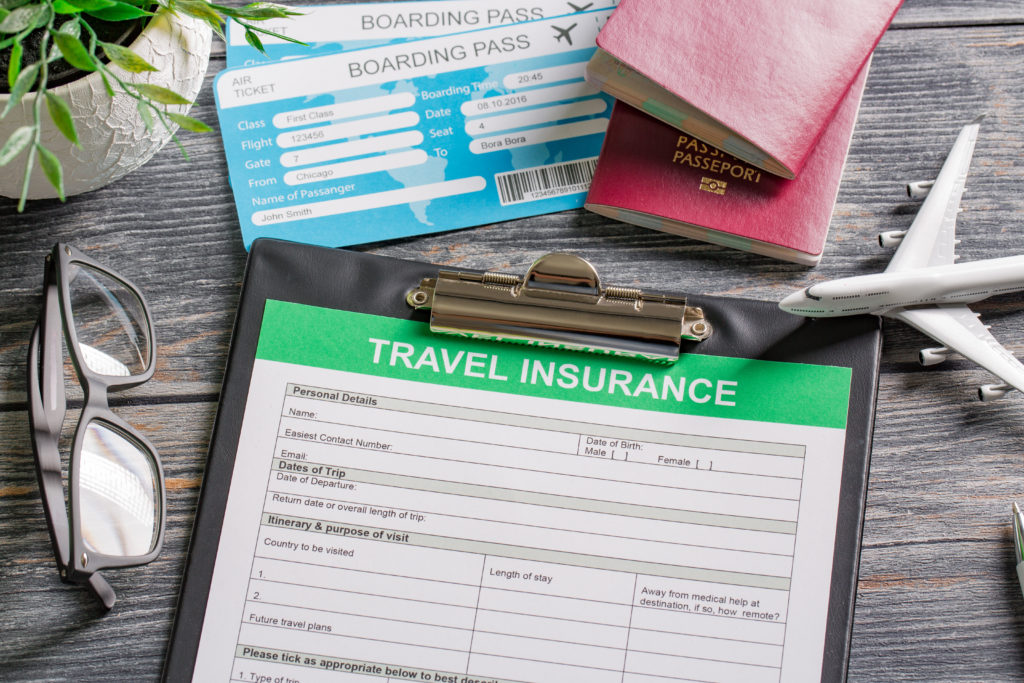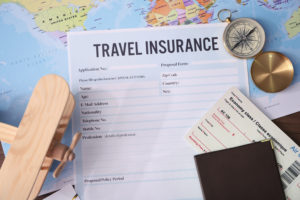As you're making travel plans for the upcoming year, you're probably wondering if you should get trip insurance. You’re not alone. A recent AAA travel survey found 31% of travelers are more likely to purchase travel insurance due to concerns surrounding COVID-19. Emerging variants and ever-changing circumstances make purchasing travel insurance seem like a good idea—or is it? We’ve put together a guide on what travel insurance is, what companies you can get it from, when you're covered by a credit card, and the surprising things travel insurance doesn't cover.
What Is Travel Insurance?

Travel insurance is coverage to help protect travelers from risks and financial losses that could occur while traveling. You may be surprised to learn many of the cancellation policies you’re looking for are already included in your travel purchase. You may also have travel insurance included with your credit card without realizing it.
Scott’s Cheap Flights Founder Scott Keyes says, “The first thing to think about when considering trip insurance is how much insurance you already have. Typically this will come in two forms:
“First, insurance that’s automatically included with every ticket purchase. For instance, if your flight gets canceled or significantly changed, you’re legally entitled to a full cash refund.
“If your flight gets canceled, the airline is still responsible for putting you on the next available flight to your destination, often including on partner airlines.
“If your bags are lost or damaged, the airline will reimburse you. If you’re sick enough to preclude travel, a doctor’s note is usually sufficient to get a refund.”
Travel providers (particularly airlines) are also offering flexibility with flight changes without charging a change fee.
Related: The Ultimate Guide to Travel Insurance: Everything You Need to Know
Credit Cards That Offer Travel Insurance
The second type of insurance you may already have is included when you purchase travel with your credit card.
“Many cards automatically include travel protections, as long as you used that card to pay for your ticket,” says Keyes. “These protections include compensation for flight delays, baggage mishaps, even reimbursement for accommodation and food for many canceled flights.”
A few (of the many) credit cards that have trip insurance include:
- Capital One Venture X. A new premium travel card from Capital One that offers trip cancellation and interruption insurance up to $2,000 per person per incident, trip delay coverage up to $500, lost luggage reimbursement up to $3,000 and auto rental collision damage waiver up to $75,000.
- Chase Sapphire Reserve & Chase Sapphire Preferred. Premium travel reward darlings Chase Sapphire Preferred and Reserve have robust trip insurance offerings. They include primary auto rental coverage, baggage delay claims up to $100 per day for five days, trip cancellation coverage up to $5,000 per trip, trip delay protection up to $500 for each ticket and lost luggage replacement cost up to $3,000.
- Bank of America Premium Rewards. This card offers trip delay reimbursement up to $500 per ticket, trip cancellation or interruption coverage up to $2,500 per trip, baggage delay insurance up to $500, lost luggage reimbursement, rental car collision insurance, and emergency evacuation and transportation coverage.
- The Platinum Card from American Express. The platinum has robust trip insurance benefits, including standard car rental coverage, though the premium car rental protection that is comparable to the car rental insurance offered by Chase Sapphire cards will cost extra. Trip cancellation and interruption coverage up to $10,000 per trip, trip delay reimbursement up to $500 per covered trip, up to $3,000 baggage reimbursement and emergency medical transport and evacuation. Benefits are further outlined here.
- Wells Fargo Visa Signature. This card comes with trip interruption and cancellation up to $2,000 per insured person, lost luggage reimbursement up to $3,000 per covered trip, travel accident coverage, and auto rental collision damage.
- U.S. Bank Altitude Reserve Visa Infinite Card. Benefits include trip cancellation or interruption coverage up to $2,000 per trip, lost luggage reimbursement up to $3,000 per trip, rental car insurance, and emergency and transportation coverage.
Credit cards generally require that the trip be paid with the credit card to qualify for its insurance. Also keep in mind that credit card insurance is generally secondary, meaning, you will need to file a claim first with the travel provider (if an airline lost your luggage, for example, you would need to file a claim with them first). Be sure to go through the terms and conditions for your card or call a member representative to fully understand coverages and benefits.
Related: Airline Credit Cards vs. Flexible Points Credit Cards: Which Should You Choose?
Types of Travel Insurance
- Trip cancellation or interruption. When something happens to prevent you from going on your trip or something happens while you’re on your trip, this type of coverage can reimburse you.
- Baggage and personal items insurance. Lost, stolen, or damaged baggage is covered under this type of policy.
- Cancel for any reason (CFAR). Under this type of travel insurance, travelers can cancel their trip for any reason that is not covered in their base plan if it is cancelled within 48 hours before the departure date. The insurer will pay a percentage of the prepaid, forfeited, non-refundable payments up to the maximum limit.
- Emergency evacuation coverage. If you need to be moved due to a medical emergency, or if you need to be moved due to civil or political unrest, this type of coverage may pay for those costs.
- Package travel insurance. This type of plan includes a comprehensive amount of coverage including coverage for evacuations, baggage and personal items insurance, medical and dental coverage, and trip cancellation or interruptions.
- Medical or dental coverage. If you find your medical or dental coverage doesn’t extend to the area you want to travel to, you may want to consider purchasing an additional medical or dental insurance policy while traveling.
- Life insurance or travel accident insurance. This type of insurance provides term life and accidental death and dismemberment protection that can occur while traveling.
- Annual and specialty travel insurance. You can buy travel insurance for the entire year under this type of policy.
Travel Insurance Companies
Trip insurance is often sold alongside your travel purchase. When you purchase an airline ticket, for example, you’ll have the option to purchase trip insurance before you finish your transaction. You don’t have to accept this option as there are other providers and policies you can buy independently.
Some of the larger providers of travel insurance include:
- Allianz Travel Insurance
- Travelex Insurance Services
- World Nomads Travel Insurance
- AIG Travel
- Seven Corners
- Generali Global Assistance
- IMG Travel Insurance
- AXA Assistance USA
- Berkshire Hathaway Travel Protection
- HTH Travel Insurance
- InsureMyTrip
- Nationwide (cruises)
- GeoBlue (medical)
- Travelinsurance.com
- Arch RoamRight Travel Insurance
Travelers can shop these policies individually. A travel agent can also help guide your decision.
Related: Cancel for Any Reason Insurance, Explained
What Trip Insurance Doesn’t Cover
Travel insurance doesn’t cover every scenario. Travel insurance company Allianz says it offers what is called named perils insurance, which means only the specific situations, events, and losses outlined in your plan documents are covered.
Trip insurance also only covers unforeseeable events. If you change your mind about going on a trip you’ve booked, trip insurance doesn’t cover that.
“Many people buy travel insurance assuming it will allow them to simply cancel the trip for a full refund if they later reconsider,” says Keyes, “But that assumption makes a fool of you and me because most insurances expressly do not cover ‘covid fear’ cancellations. Even if you bought the most expensive Cancel for Any Reason insurance, it’s quite pricey and you still typically only get reimbursed 75% of your ticket cost.” Keyes warns, “If you do decide to purchase extra insurance, be sure to shop around (don’t just buy the insurance offered by the airline at checkout!) and ensure that personally contracting covid is covered—rather than excluded—under the policy.”






